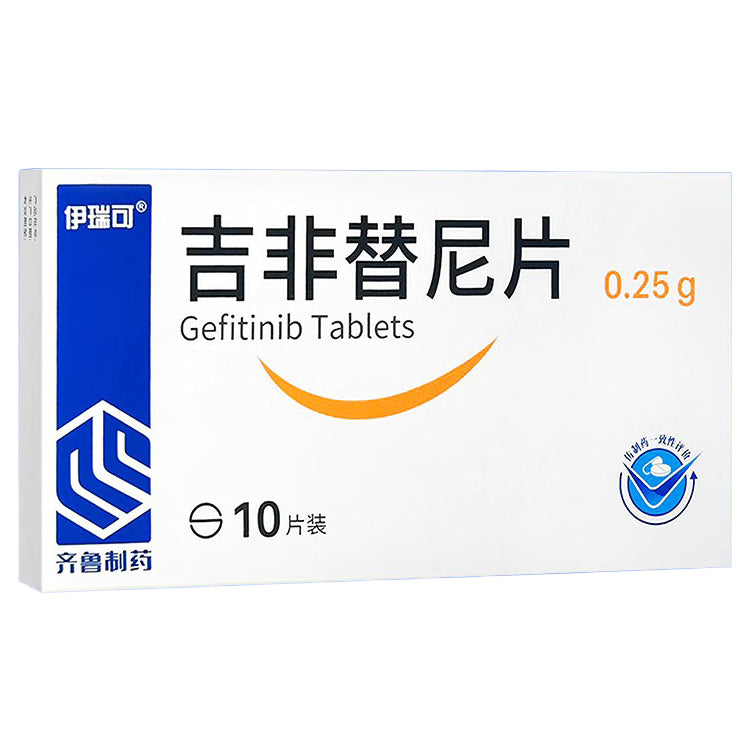Qilu Pharmaceutical Co., Ltd
伊瑞可 吉非替尼片, Таблетки Гефитиниба, Джифеитини Пиан, 0,25 г*10 таблеток
伊瑞可 吉非替尼片, Таблетки Гефитиниба, Джифеитини Пиан, 0,25 г*10 таблеток
Не удалось загрузить сведения о доступности самовывоза
Название препарата
Таблетки гефитиниба
Джифейтини Пиан
китайское фото
Состав
Каждая таблетка содержит гефитиниб в качестве активного ингредиента.
Описание
Таблетки, покрытые пленочной оболочкой коричневого цвета, белого или почти белого цвета после удаления оболочки.
Показания
Данный препарат показан в качестве монотерапии для первой линии лечения местнораспространенного или метастатического немелкоклеточного рака легких (НМРЛ) с мутациями гена, чувствительными к рецептору эпидермального фактора роста (EGFR) (см. Меры предосторожности).
Результаты двух крупных рандомизированных контролируемых клинических исследований показали, что применение гефитиниба в комбинации с химиотерапией на основе платины в качестве терапии первой линии при местно-распространенном или метастатическом НМРЛ не продемонстрировало клинической эффективности. Поэтому такие комбинированные схемы не рекомендуются в качестве терапии первой линии.
Данный препарат может использоваться в качестве монотерапии для лечения местно-распространённого или метастатического немелкоклеточного рака лёгкого, не достигшего эффекта после как минимум одного курса химиотерапии. Данный препарат не рекомендуется пациентам с немелкоклеточным раком лёгкого с диким типом EGFR.
Способ применения и дозировка
Рекомендуемая доза составляет 250 мг (1 таблетка) один раз в сутки, внутрь, независимо от приема пищи. В случае пропуска приема препарата пациент должен принять его, как только вспомнит об этом. Если следующий прием должен быть проведен в течение 12 часов, пропущенную дозу следует пропустить. Пациентам не следует удваивать дозу для компенсации пропущенного приема.
Если таблетку невозможно принять целиком (например, пациентам, которые могут глотать только жидкости), таблетку можно растворить в воде. Поместите таблетку в половину стакана питьевой воды (негазированной), размешайте, не измельчая, до полного растворения (примерно 15 минут), и немедленно выпейте. Ополосните стакан половиной стакана воды и выпейте раствор. Раствор также можно ввести через назогастральный зонд.
Корректировка дозировки
Корректировка дозировки в зависимости от возраста, веса, пола, этнической принадлежности, функции почек или умеренной или тяжелой печеночной недостаточности вследствие метастазов в печень не требуется.
Если у пациента наблюдается непереносимая диарея или побочные реакции со стороны кожи, лечение может быть временно приостановлено (на срок до 14 дней), после чего можно возобновить прием препарата в суточной дозе 250 мг (см. раздел «Побочные реакции»).
Применение у детей
Данные о безопасности и эффективности гефитиниба у детей и подростков отсутствуют, поэтому его применение у этой группы пациентов не рекомендуется.
Побочные реакции
Наиболее частыми (≥20%) нежелательными лекарственными реакциями (НЛР) являются диарея и кожные реакции (включая сыпь, акне, сухость кожи и зуд), которые обычно возникают в течение первого месяца лечения и обычно обратимы. Тяжёлые НЛР (3-й или 4-й степени по критериям NCI CTCAE) наблюдаются примерно у 10% пациентов. Прекращение лечения из-за НЛР происходит примерно у 3% пациентов.
Противопоказания
Повышенная чувствительность к активному веществу или любому вспомогательному веществу в составе продукта.
Меры предосторожности
При рассмотрении применения гефитиниба в качестве терапии первой линии при распространенном или метастатическом НМРЛ всем пациентам рекомендуется провести исследование на мутацию EGFR в опухолевой ткани. Если образцы опухоли не поддаются оценке, можно использовать циркулирующую опухолевую ДНК (цДНК) из крови (плазмы).
Во избежание ложноотрицательных или ложноположительных результатов следует использовать только проверенные анализы с доказанной надежностью и чувствительностью для обнаружения мутаций EGFR в опухолевой ткани или ctDNA.
Применение во время беременности и кормления грудью :
Беременность : Данные о применении гефитиниба у беременных женщин отсутствуют. У крыс введение гефитиниба в дозах, токсичных для материнского организма, в период органогенеза увеличивало частоту неполной оссификации. У кроликов наблюдалось снижение массы плода. Пороков развития у крыс не наблюдалось, а у кроликов они наблюдались только при применении доз, токсичных для материнского организма. Женщинам детородного возраста следует рекомендовать избегать беременности во время лечения гефитинибом.
Лактация : Женщинам следует рекомендовать прекратить грудное вскармливание во время лечения гефитинибом. Данные о выделении гефитиниба с грудным молоком отсутствуют. Однако у кормящих крыс гефитиниб и некоторые его метаболиты активно секретировались в молоко после перорального введения в дозе 5 мг/кг (0,2 клинической дозы в пересчёте на площадь поверхности тела). Введение гефитиниба в дозе 20 мг/кг/сут (0,7 клинической дозы в пересчёте на площадь поверхности тела) во время беременности и лактации у крыс снижало выживаемость детёнышей.
Гериатрическое использование
Специальных исследований среди пациентов пожилого возраста не проводилось.
Фармакологическое действие
Рецептор эпидермального фактора роста (EGFR) экспрессируется как в нормальных, так и в опухолевых клетках и играет важную роль в росте и дифференцировке клеток. Мутации EGFR (делеция экзона 19 и мутация экзона 21 L858R) в клетках НМРЛ стимулируют рост опухоли, ингибируют апоптоз, увеличивают продукцию сосудистых факторов роста и усиливают метастазирование опухоли. Гефитиниб является обратимым ингибитором дикого типа и некоторых мутантных EGFR, ингибируя аутофосфорилирование тирозинкиназы EGFR и нисходящую сигнализацию, тем самым блокируя EGFR-зависимую пролиферацию клеток. Гефитиниб имеет большее сродство к мутантным EGFR (делеция экзона 19 и мутация экзона 21 L858R), чем к EGFR дикого типа. В клинически значимых концентрациях гефитиниб может также ингибировать сигнализацию, опосредованную IGF и PDGF; его ингибирующее действие на другие тирозинкиназы недостаточно изучено.
Хранилище
Хранить при температуре ниже 30°C.
Технические характеристики
0,25 г.
Упаковка
0,25 г × 10 таблеток в упаковке.
Истечение срока действия
24 месяца.
Если вы ищете дополнительные скидки или заинтересованы в покупке других китайских лекарств, пожалуйста, не стесняйтесь обращаться к нам в любое время. Мы полностью посвящены предоставлению вам комплексных услуг, адаптированных к вашим индивидуальным потребностям.
Делиться


